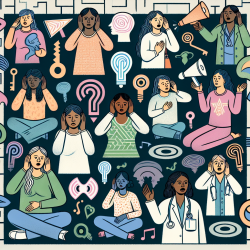Auditory verbal hallucinations, commonly known as hearing voices, have been a subject of intrigue and study for many years. While often associated with mental health conditions such as schizophrenia, these experiences are not limited to any single diagnosis. A recent study titled "Hearing the Unheard: An Interdisciplinary, Mixed Methodology Study of Women’s Experiences of Hearing Voices (Auditory Verbal Hallucinations)" sheds light on how gender influences these experiences and offers valuable insights for practitioners.
The Gender Perspective in Voice-Hearing
The study reveals that women who hear voices face unique challenges that are often intertwined with their social context and personal histories. Historically, women's experiences of voice-hearing were interpreted through a patriarchal lens, which often led to their voices being dismissed or misunderstood. This historical backdrop continues to influence contemporary understandings and treatment approaches.
Key Findings from the Study
- Historical Context: Women's voice-hearing experiences were historically shaped by patriarchal theories that viewed them as unreliable witnesses to their own experiences. This has evolved but still impacts how women's voices are perceived today.
- Trauma and Voice-Hearing: The study highlights a strong correlation between trauma and voice-hearing in women. Women are more likely than men to report traumatic antecedents to their voice-hearing experiences.
- Interpretation and Coping: Women often interpret their voices as signs of serious mental health issues but also seek personal meaning through various lenses, including psychological and paranormal explanations.
- Cultural Influences: The content and nature of the voices women hear are influenced by cultural norms and gender roles, which can exacerbate feelings of disempowerment and isolation.
Implications for Practitioners
For mental health practitioners working with women who experience auditory verbal hallucinations, it is crucial to adopt a trauma-informed approach. Recognizing the role of past traumas in shaping these experiences can lead to more empathetic and effective interventions. Additionally, encouraging women to explore their own interpretations and meanings of their voices can empower them and facilitate recovery.
Encouraging Further Research
The study serves as a call to action for further research into the gender-specific aspects of voice-hearing. Understanding the nuanced ways in which gender influences these experiences can lead to more tailored and effective therapeutic approaches. Researchers are encouraged to delve deeper into the intersectionality of gender, culture, and mental health to uncover new insights.
To read the original research paper, please follow this link: Hearing the Unheard: An Interdisciplinary, Mixed Methodology Study of Women’s Experiences of Hearing Voices (Auditory Verbal Hallucinations).










